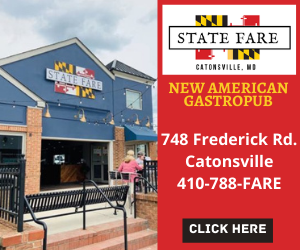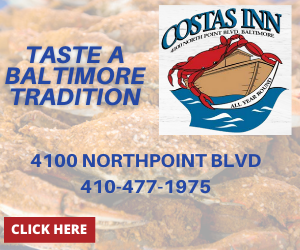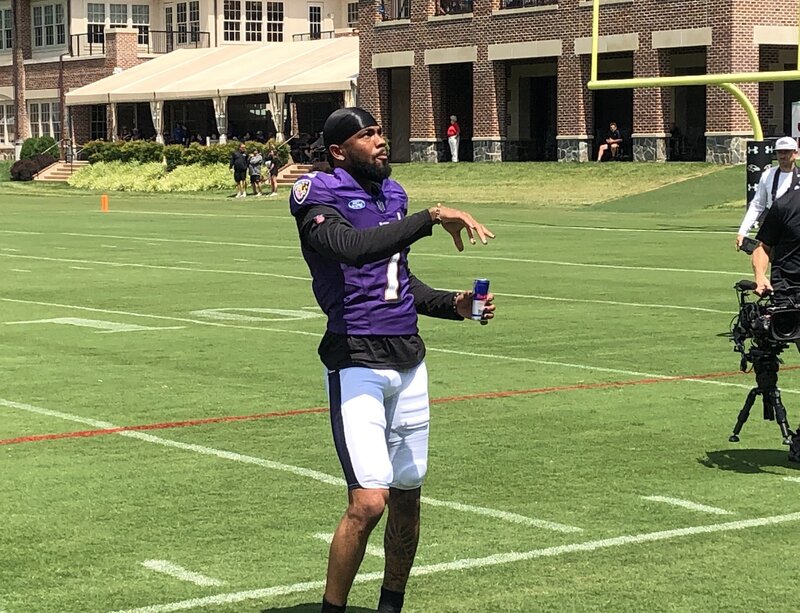The story is now beyond famous. It is infamous.
A limo speeding away from Buckhead, a trendy bar area in suburban Atlanta six hours after the Super Bowl ended. Two dead bodies in the street, lying in a pool of blood. Bullets fired into the air. And one Pro Bowl linebacker charged with murder on the eve of the Pro Bowl.
Being on the radio – locally and nationally – I think I’ve heard just about every argument for and against Ray Lewis in this case.
I’ve certainly taken my fair share of heat for going to the mat to support him. People have accused me of supporting him because he was my friend. But I only had one reason to believe in him. I think he’s an innocent guy who got caught in a bad position.
“Nothing good ever happens after 2 a.m. in a bar,” a friend once told me.
So many questions remain, many of which we’ll probably never know the answers.
The facts are simple and indisputable:
Ray Lewis was out with his friends. Ray Lewis was drinking and having fun. Ray Lewis was not driving. He had a limousine. Ray Lewis was very conspicuous by his appearance, sporting jewels and a white mink coat, which I had actually seen him in the night before the incident in my hotel in Atlanta. Ray Lewis was famous, targeted and wanted it that way. He was not trying to blend into the scene. People knew he was Ray Lewis and Lewis like that. Ray Lewis had never been in a bar fight in his life. Ray Lewis was doing nothing that at least a hundred other NFL players, many of whom had far less celebrity, were doing in Atlanta that night. The Super Bowl is a chance for NFL players to show off their excess, access, wealth and celebrity. Ray Lewis and his friends were not looking for trouble. They were trying to go back to their car and go home for the evening.
After that, it gets blurry.
All we know is what we saw on Court TV.
Here is my interpretation of the events:
Two men followed Lewis and his party, which included Joseph Sweeting, Reginald Oakley and others, out of the Cobalt Lounge in Buckhead, an Atlanta suburb famous for its nightlife, for more than three blocks down East Paces Ferry Road. The men were baiting Lewis and his friends with a series of name-calling, trash talking and threats. Lewis’ friends jawed back.
Keep in mind that the two men who would be dead in a few short moments were the ones doing the pursuing. Ray Lewis and his friends were walking toward their vehicle.
By the time they got to the limousine, the words had escalated. Lewis, in the full view of everyone on the scene of the crime, was the peacekeeper. He was shepherding everyone into the car and begging them not to fight, to walk away.
The two guys who were stalking Lewis and his group of friends were not only outmanned nearly three to one, but they were half the size of any football player. One was 5-feet-2 and less than 125 pounds. What was he doing messing with these big guys? Did he have a weapon? A gun? Did they want to rob Ray Lewis?
Without question, Lewis was the guy on the scene who had the most to lose if there was any trouble. He had the money. He had the career. He had the fame.
As they finally turned to get into the car under Lewis’ direction – he physically was shoving his angry friends into the car – Sweeting reportedly was hit on the head by a champagne bottle and all hell broke loose.
Within 30 seconds there are two guys fallen in the street and Lewis and his friends are being shot at in their limousine speeding away. A tire is hit by a bullet and quickly going flat, and five minutes later Lewis is in the lobby of the Holiday Inn trying to figure out what has happened. There is blood in the limousine and all over his friends, but whose blood is it? It could be the blood of Sweeting, since his head is busted open. It could be the blood of the victims?
What happened next we might never know.
Lewis later testified that Sweeting and Oakley talked about hitting their guys. He was mum about the use of any weapons during the incident. Sweeting and Oakley certainly had weapons in Atlanta because they had purchased them at Lewis’ autograph appearance at a sporting goods store the day before the Super Bowl.
What is Lewis doing hanging out with guys who have knives? What is the intention of someone who would buy a knife at a sporting goods store?
Both of his friends had criminal pasts. Later, Lewis told his old Miami reporter friend Dan LeBatard of ESPN Magazine that he had no knowledge of that.
“People on the outside said I should have picked better friends, but that’s like telling the Chargers to pick better players. What was I supposed to do? Background checks on my friends? Psychological profiles? I can’t predict intentions. If one of your friends robs a bank today, did you know it was going to happen? The guys I was with that night weren’t guys I grew up with. I didn’t know they had records. I learned about that when everyone else did. If I was to eliminate everyone in my life who had done something bad in their past, then I’d have to eliminate myself, too, to be honest with you, because, like most people, I’ve done plenty of wrong.”
As for the two dead men in the street – Richard Lollar and Jacinth “Shorty” Baker – there is little question in my mind that they were asking for trouble. They followed a group of folks who wanted to be left alone for three blocks away from a bar and continued escalating the problem until, reportedly, they instigated the violence by cracking a stranger over the head with a champagne bottle.
Did they get the trouble that they had asked for, following a large group down the street for three blocks?
Was this self-defense?
Certainly no one deserved to die over a silly argument of words, and now Lewis – the famous one – would certainly be questioned, if not implicated.
Lewis was scared. He rushed back to his hotel at the Georgian Terrace and immediately began covering up any involvement he might have had. He eliminated the clothing he had worn. Avoided questioning. Provided a series of vague answers to the police and lied under questioning.
He was obviously following the rule of the street: never rat out a friend. But when double murder is the charge, does that rule still follow?
If it had been you and your friends or relatives, would you have sung to the police the next morning?
Good questions, one and all. Questions that I honestly don’t have answers to and ones that Lewis told LeBatard his feelings about.
“You have one second to decide what to do. People say the smartest thing to do is walk away. It is the safest thing to do, yeah. But it isn’t the most loyal or most courageous thing to do. It may not even be the right thing to do, if you care at all about your friends, if you care about anybody other than yourself. I tried to break the fight up. And look at what it got me.”
What it got Lewis was 15 days in jail in Atlanta. Lewis missed the Pro Bowl in Hawaii, watching from jail. The trial cost Lewis more than $2 million in court costs and legal fees. Then, he was fined another $250,000 by the NFL. He spent nearly four months under a pseudo-house arrest, where he couldn’t go out after dark. He was only allowed to be in Baltimore and Atlanta prior to the trial.
“This mess cost me my good name, cost me months of my life in jail and on trial, cost me faith in the judicial system and in the media and in ‘innocent until proven guilty,’ ” Lewis told LeBatard. “And it has cost me two groups of fans – the group that hated me for being in that courtroom to begin with and the keepin’-it-real folks who thought I shouldn’t have testified against my friends. It was an expensive lesson all around.”
When the mess was over, Lewis pleaded guilty to a misdemeanor charge of obstruction of justice.
The Atlanta court system should be disgraced that Lewis was ever charged with murder, especially just 24 hours after the event. They knew where Lewis was, they had very little evidence of anything other than he was at the scene of the crime and the fact that they arrested him so quickly made him look even more guilty in the public eye.
Lewis believes, and perhaps rightfully so, that he was used by the Atlanta political system as a figurehead and a pawn. They were more caught up in killing his reputation than in seeking the killers.
To many, especially those in the mass media, there will always be questions.
For me, I have no questions for Ray Lewis, other than why he didn’t answer more questions at the Super Bowl when he had a fighting chance to change any and or all of the negative perceptions about him.
I’m certainly not in a position to hand out advice to Ray Lewis. But stonewalling a group of 3,000 reporters on Super Bowl media day just isn’t smart. If you want your name cleared – and based on seeing Lewis’ demeanor throughout the season, he desperately does – then you have to play the game a little better than saying “no comment” and refusing to answer questions.
No matter how angry you are, no matter how many stories have been written that are inaccurate, false or unfair, this was his chance to tell his story in real time with the cameras rolling.
And, in my opinion, he blew it horribly.
My advice to Ray would have been to smile and tell your story. Let the “real” Ray Lewis come out for people to see. When you hide behind “no comment,” people obviously feel like you have something to hide or something to feel ashamed about. If you truly did nothing wrong, then say so.
What made matters worse for Lewis than to play dumb for thousands of media folks with the bright lights shining as well as the millions of football fans—friends and foes, alike – were the actions of his counterparts from New York.
While Lewis was being evasive or just plain mum that day – and some of the pre-press he arrived to see on ESPN was just what head coach Brian Billick called it, “ambulance chasing” – Giants quarterback Kerry Collins, who had been the poster boy for bad behavior with teammates, alcohol, demeanor and racial problems and a total breakdown two years before, was facing the music like a man. Collins talked freely, openly and honestly about his former self and was widely praised not only by the media but also by his peers.
For Lewis, there have been no repercussions in his own locker room. Much like Woodson and owner Art Modell, who came to his defense immediately when he was being arraigned in Atlanta, his teammates and peers around the league understood his innocence and embraced him, sight unseen. Ray Lewis is one of the most beloved, respected and likeable guys in the league.
But if he hoped to win over the rest of the world, he missed a golden opportunity, one that may never present itself again.
He didn’t owe anyone an explanation – certainly not those who interviewed the families of the victims who called Lewis a murderer and put it on ESPN that night – and he had nothing to “apologize” for. But in one hour on a sunny Tuesday in Tampa, he could have put the entire event to rest forever by using a little intestinal fortitude, honesty and savvy. Instead, the questions remain and the criticism and the damnation will continue.
But Lewis was distant toward almost everyone in the media during the 2000 season, and I took the full brunt of wearing my press badge. Suddenly, after the trial, Ray Lewis and I were no longer friends. He was a football player and I was just another guy in the locker room.
It was all I could do to get a handshake or a smile, even after big wins. I never shoved a microphone in his face or pressured him. I never asked him about Atlanta or jail or murders. I routinely invited him to The Barn, just like I always did. I offered to not pre-promote the fact that he was coming, because, quite frankly I didn’t need the mob scene that Ray Lewis would bring any more than he did. My show was plenty crowded on Mondays, with or with Lewis. He said he’d come, but he never did.
































